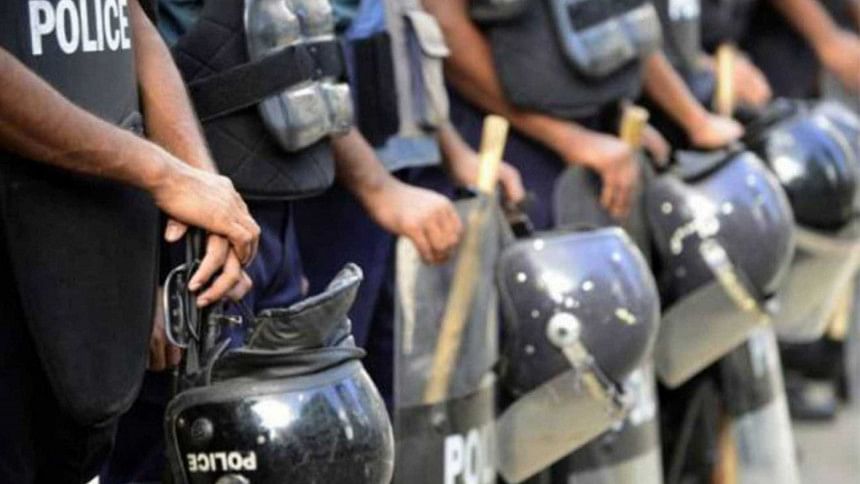Cleaning up our police force is critical

The malfeasance and misfeasance of some errant police officials in the recent past—which brought into sharp focus their worrisome delinquency—has perhaps prompted the Inspector General of Police to initiate a process of cleaning that apparently aims to rid the police of bad apples. The admirable pragmatism behind such an initiative cannot escape the discerning eye, because the misdeeds of the police impinge quite adversely on people's liberty, in addition to the lamentable erosion of public confidence in a vital regulatory organ of the state funded by taxpayer's money.
It's worth reiterating that the delinquent actions or inactions of deviant police personnel are not a mere figment of the imagination. Instead, these are hard realities which would have been less ominous had they been rare instances of misconduct on the part of a coercive organisation. Corrective measures to contain police deviance assumes added significance because the protectors of citizens cannot be allowed to indulge in any kind of activities that are dubious or deplorable. Police has to come clean in the mirror of public opinion.
A democratic society which values individual liberty will look very closely at any infringement of that liberty by the government, and at the particular arm whose actions are seen to be restrictive. The power wielded by police is all the more worrying for members of society if they feel they have no means of controlling the police and their powers. We have to bear in mind that no other individual or body has anything like the general powers police have. Often, the momentous question of the suspension of individual rights is decided by the most junior and inexperienced members of the police force.
A police officer has lawful power to take away individual liberty by arrest, questioning about movements, and demanding name, address and proof of identity. Police powers frequently authorise officials to use force if necessary.
In view of the stipulations above, the cleaning endeavour has to ensure that undesirable and unacceptable individuals have no place in the police force and there must be some means of removing them. The most obvious criterion for a system of investigating complaints about police behaviour is that it be stringent, effective, and capable of discovering facts. This requires trained, experienced, skilled investigators and the largest number of such individuals has to be found within the police organisation itself. It is also necessary that the public have confidence in the rigour of the investigative process. The public needs to be given faith in the fact that allegations of unacceptable behaviour by police officers will be investigated and dealt with. However, it would be pertinent to note that the traditional police discipline code is now of less use to a modern police service. What's more needed is a properly introduced code of ethics and sound training in its principles.
It is time to come out of the colonial policing model of order maintenance and reactive strategies and move towards a service culture which requires officers to work with the community to keep the peace and prevent crimes. This change in policing ethos is expected to bring a new view of police officers who are required to be culturally sensitive, and agents of assistance rather than control. There has to be a realisation that police officials are accountable not just for what they do but how they do it; they can no longer be unthinking, unquestioning functionaries accountable only to senior officers. The change has to come through management by leadership and consensus.
It is important to note that behavioural norms of our police organisation need to change. For this to become a reality, police norms have to comply with the requirements of the organisation. In plain words, the police culture must broadly conform to the new code of ethics. The question is, how can this be done? Admittedly, training has a large part to play in modifying police culture to the mores required in modern progressive policing. This will, however, be a long-term strategy. At the same time, the traditional "carrot and stick" (reward and sanction) process has to continue. There has to be rewards like promotion, pay increments or preferment for those whose actions merit it—and sanctions to rid the organisation of those whose behaviour is seriously unacceptable to merit dismissal.
The propositions placed above cannot be effected in isolation without looking at the broader canvas of the trappings of our subcontinental colonial policing. We have to remember that the "colonial-repressive" character of out policing emerged when the governing elite of a decolonised society had decided to retain the inherited police organisation, bypassing justified demands for change. In other words, we have retained the colonial administrative, police and judicial structures without recasting them to meet the changed situation, although we have adopted a written, liberal democratic constitution.
There is a cynical view that politicians in the subcontinent do not want to professionalise the police service because control over it is central to political conflict in a polarised society. Putting all the blame on the political class, ignoring the less-than-proactive role of police leadership, would be grossly unfair. The imperative, quite clearly, is mental decolonisation to ensure a fair and merit-based police service.
Muhammad Nurul Huda is a former IGP of Bangladesh.

 For all latest news, follow The Daily Star's Google News channel.
For all latest news, follow The Daily Star's Google News channel. 



Comments